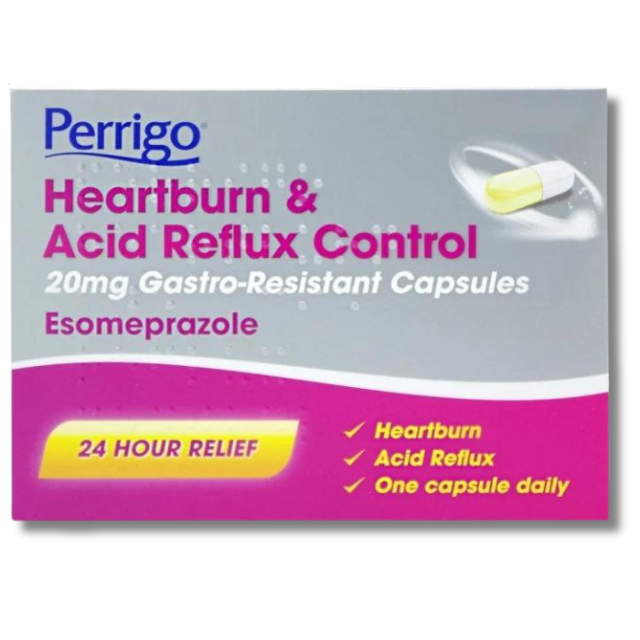Description
Perrigo esomeprazole capsules are a good choice of treatment for when symptoms of heartburn and acid reflux become too much to tolerate. With the help of one capsule a day, this is a quick and easy way to keep acid reflux or indigestion symptoms under control.
Usage Instructions:
- You can take your capsules at any time of the day.
- You can take your capsules with food or on an empty stomach.
- Swallow your capsules whole with a drink of water. Do not chew or crush the capsules. This is because the capsules contain coated pellets which stop the medicine from being broken down by the acid in your stomach. It is important not to damage the pellets.
- PLEASE REFER TO PATIENT INFORMATION LEAFLET FOR FULL DOSAGE INSTRUCTIONS
Always take this medicine exactly as your doctor has told you. Check with your doctor or pharmacist if you are not sure.
- Esomeprazole is not recommended for children less than 12 years old.
- If you are taking this medicine for a long time, your doctor will want to monitor you (particularly if you are taking it for more than a year).
- If your doctor has told you to take this medicine as and when you need it, tell your doctor if your symptoms change.
Warnings:
Do not take:
- If you are allergic to esomeprazole or any of the other ingredients of this medicine.
- If you are allergic to the group of medicines called ‘benzimidazoles’, which includes other proton pump inhibitor medicines (e.g. pantoprazole, lansoprazole, rabeprazole, omeprazole) as well as other different types of medicine.
- If you are taking a medicine containing nelfinavir (used to treat HIV infection). Do not take Esomeprazole if any of the above applies to you. If you are not sure, talk to your doctor or pharmacist before taking Esomeprazole.
Warnings and Precautions Talk to your doctor or pharmacist:
- If you have severe liver problems.
- If you have severe kidney problems.
- If you have ever had a skin reaction after treatment with a medicine similar to esomeprazole that reduces stomach acid.
- If you are due to have a specific blood test (Chromogranin A).
Do not take Esomeprazole if you are taking a medicine containing nelfinavir (used to treat HIV).
Tell your doctor or pharmacist if you are taking any of the following medicines:
- Atazanavir (used to treat HIV).
- Ketoconazole, itraconazole or voriconazole (used to treat infections caused by a fungus).
- Erlotinib (used to treat cancer).
- Citalopram, imipramine or clomipramine (used to treat depression).
- Diazepam (used to treat anxiety, relax muscles or in epilepsy).
- Phenytoin (used in epilepsy). If you are taking phenytoin, your doctor will need to monitor you when you start or stop taking Esomeprazole.
- Medicines that are used to thin your blood, such as warfarin. Your doctor may need to monitor you when you start or stop taking Esomeprazole.
- Cilostazol (used to treat intermittent claudication – a pain in your legs when you walk which is caused by an insufficient blood supply).
- Cisapride (used for indigestion and heartburn).
- Clopidogrel (used to prevent blood clots (thrombi)).
- Digoxin (used for heart problems).
- Tacrolimus (used to reduce the immune response, helping to prevent rejection of organ transplant or to treat skin reactions such as eczema)
- Methotrexate (a chemotherapy medicine used in high doses to treat cancer) – if you are taking a high dose of methotrexate, your doctor may temporarily stop your Esomeprazole treatment.
- Rifampicin (used for treatment of tuberculosis).
- St. John’s wort (Hypericum perforatum) (used to treat depression).
If your doctor has prescribed the antibiotics amoxicillin and clarithromycin as well as Esomeprazole to treat ulcers caused by Helicobacter pylori infection, it is very important that you tell your doctor about any other medicines you are taking.
Pregnancy and breast-feeding:
If you are pregnant, think you might be pregnant or are planning to have a baby, ask your doctor or pharmacist for advice before taking this medicine. Your doctor will decide whether you can take Esomeprazole during this time. It is not known if esomeprazole passes into breast milk. Therefore, you should not take Esomeprazole if you are breast-feeding.
Driving and using machines:
Esomeprazole can cause side effects such as dizziness and blurred vision. If you are affected by these you should not drive, use tools or operate machinery.
Esomeprazole contains sucrose:
If you have been told by your doctor that you have an intolerance to some sugars, such as sucrose, talk to your doctor before taking this medicine.
Please read the patient information leaflet carefully before use for an in depth guide on use and warnings.
PIL Link:
Payment & Security
Your payment information is processed securely. We do not store credit card details nor have access to your credit card information.

